 January 2024 in “JEADV clinical practice”
January 2024 in “JEADV clinical practice” Gender-affirming dermatology treatments generally improve mental well-being for transgender individuals, but more research is needed.
 51 citations,
November 2005 in “Journal of Medical Primatology”
51 citations,
November 2005 in “Journal of Medical Primatology” Alopecia in captive rhesus macaques is affected by season, sex, age, housing, and stress, with complex links between stress hormones and hair loss.
 17 citations,
November 2013 in “American Journal of Primatology”
17 citations,
November 2013 in “American Journal of Primatology” Different monkey species in a lab showed varying levels of hair loss due to factors like type, sex, age, season, and living conditions.
 January 2023 in “Social Science Research Network”
January 2023 in “Social Science Research Network” The document doesn't say if the treatment for hair loss worked.
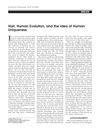 7 citations,
August 2005 in “Evolutionary anthropology”
7 citations,
August 2005 in “Evolutionary anthropology” Human hair is unique and important for understanding human evolution and identity.
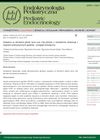 1 citations,
January 2017 in “Endokrynologia Pediatryczna”
1 citations,
January 2017 in “Endokrynologia Pediatryczna” PCOS negatively affects self-esteem and social functioning in adolescent girls.
 1 citations,
February 2017 in “Journal of Aesthetic Nursing”
1 citations,
February 2017 in “Journal of Aesthetic Nursing” Men are getting more beard transplants to look better and follow fashion trends.
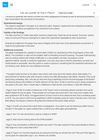
Reviewers criticized the study for assuming drugs with similar side-effects work the same way and questioned the validity of its findings due to potential biases and data quality issues.
 5 citations,
April 2007 in “Popular Communication”
5 citations,
April 2007 in “Popular Communication” Makeover TV shows promote unrealistic beauty standards and pressure women to conform to societal ideals.
 117 citations,
August 2008 in “Sociology of Health and Illness”
117 citations,
August 2008 in “Sociology of Health and Illness” The conclusion is that the increasing use of drugs for lifestyle reasons is a complex issue influenced by corporate profit, consumer behavior, and the medicalization of everyday life, with potential negative effects on personal well-being.
 December 2017 in “PubMed”
December 2017 in “PubMed” Society's pressure to have children later in life favors genes that increase the risk of early baldness in male offspring.
 19 citations,
January 2001 in “Dermatology + psychosomatics”
19 citations,
January 2001 in “Dermatology + psychosomatics” The review concluded that male pattern baldness is mostly seen negatively, affecting attractiveness and social appeal.
 January 2021 in “Social Science Research Network”
January 2021 in “Social Science Research Network” The new treatment using tiny lipid carriers to deliver minoxidil and latanoprost directly to hair follicles shows promise for alopecia.
 August 2023 in “Dataset Reports”
August 2023 in “Dataset Reports” Social media influencers often promote self-medication, which can be dangerous without professional guidance.
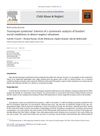 23 citations,
September 2009 in “Child Abuse & Neglect”
23 citations,
September 2009 in “Child Abuse & Neglect” Checking family social conditions in tourniquet syndrome cases can help find neglect.
 44 citations,
December 2010 in “Journal of Investigative Dermatology”
44 citations,
December 2010 in “Journal of Investigative Dermatology” Alopecia areata seriously lowers quality of life, especially affecting self-image, mental health, and social life.
 4 citations,
July 2021 in “International Journal of Environmental Research and Public Health”
4 citations,
July 2021 in “International Journal of Environmental Research and Public Health” Women who lost hair from childhood head radiation are more likely to face mental health issues than men.
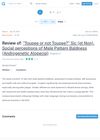
Toupees improved perceived attractiveness, especially by older people, but had little effect on perceived self-assurance and health.
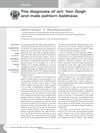 2 citations,
January 2009 in “Journal of the Royal Society of Medicine”
2 citations,
January 2009 in “Journal of the Royal Society of Medicine” Art often hides male pattern baldness, but van Gogh's work links it to depression.
20 citations,
March 2017 in “Arthritis research & therapy” Social media can help compare the effectiveness and safety of new arthritis medications.
1 citations,
January 2021 in “Clinical dermatology review” Severe hair loss significantly worsens quality of life.
January 2022 in “Social Science Research Network” Potassium channel modulators mostly increase the activity of rat whisker mechanoreceptors.
 26 citations,
October 2021 in “Current Dermatology Reports”
26 citations,
October 2021 in “Current Dermatology Reports” Social media is increasingly used in dermatology for education and networking but has risks like misinformation and privacy issues.
January 2019 in “Social Science Research Network” Hair follicle stem cells prevent melanocyte stem cells from differentiating by controlling retinoic acid levels.
January 2018 in “Social Science Research Network” Certain small molecules that trigger cell cleanup processes can promote hair growth.
 2 citations,
April 2021 in “Journal of Cosmetic Dermatology”
2 citations,
April 2021 in “Journal of Cosmetic Dermatology” Hair loss lowers young men's self-esteem, increasing social anxiety and affecting daily life.
 27 citations,
March 2013 in “Social Semiotics”
27 citations,
March 2013 in “Social Semiotics” Commercial hair loss websites promote Propecia by making men feel insecure about baldness and suggesting it's a medical issue needing treatment.
 105 citations,
February 2017 in “British Journal of Dermatology”
105 citations,
February 2017 in “British Journal of Dermatology” Survivors of Stevens-Johnson syndrome/toxic epidermal necrolysis need ongoing care for various long-term health problems.
 January 2022 in “Social Science Research Network”
January 2022 in “Social Science Research Network” A new patch that releases quercetin, copper, and zinc ions under the skin can effectively treat hair loss by promoting hair follicle regeneration.
 January 2022 in “Social Science Research Network”
January 2022 in “Social Science Research Network” Pyruvate Kinase M2 helps hair grow by linking energy production and a key hair growth pathway.

























